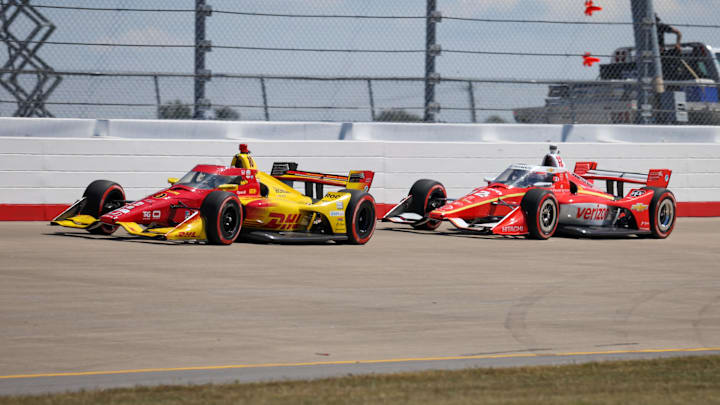If Alex Palou had any semblance of an antagonistic side to go along with his current IndyCar dominance and run of three consecutive championships, he'd be a perfect Denny Hamlin.
For the IndyCar fans who don't follow much NASCAR, we're talking about the whole "I beat your favorite driver" line Hamlin uses, always amid a sea of boos from the grandstands, from time to time (even after saying he was done using it) when he wins a Cup Series race.
Ironically, Palou actually wins at a much higher rate than Hamlin (and is a champion in his series). This year, he won five out of the first six races, including his first Indy 500, and he won three races post-Indy 500, giving him a modern era record eight wins.
He won the championship by 196 points, meaning four of his eight wins could have actually been DNFs and he'd have still been crowned champion for the third year in a row and fourth time in five years.
He also clinched the title with two races remaining, which hadn't been done in 23 years, and he did it just two years after becoming the first in 16 years to clinch with a race left. And for as often as he won (eight of 17), he also managed to lead the series in runner-up finishes with four.
At some point during a 2025 season in which Palou's lowest position in the championship was – uh – P1, certain fans – more specifically, the haters who decided they can't stand him winning – opted to make up a complete and utterly nonsensical narrative that Palou winning is killing the sport.
Of course, these are the very folks who would complain even louder if IndyCar races were won by a true "villain", as we saw last year when Josef Newgarden won the Indy 500 fresh off the push-to-pass scandal. Motorsport fanbases have a reputation for being hard, if not impossible, to please, so there were no surprises here.
But getting back to the narrative of Palou "killing the sport", put it this way. As James Hinchcliffe famously said a few years ago at Texas Motor Speedway: "That's adorable."
No. Really. It is. And it's actually kind of funny.
Ratings showed it.
In Fox's first year as the exclusive broadcast partner of America's top, and still most competitive, open-wheel racing series, viewership was up across the board, including in several key metrics not only in terms of IndyCar success, but in terms of success compared to other sports that also have a significant following.
📈🏁Thank you @IndyCar fans! pic.twitter.com/WvW6uhV4zq
— INDYCAR on FOX (@IndyCarOnFOX) September 3, 2025
Are we saying ratings couldn't have been better had the championship been closer? Not at all, especially if IndyCar's most popular driver, Pato O'Ward, had been able to keep that 196-point gap to something far narrower.
And imagine if IndyCar had actually publicized the oval championship battle between Palou and O'Ward, which actually did come down to the wire.
But the fact that fans would actually imply that a 27% increase in viewers is "killing the sport" is enough proof to suggest that Twitter is not a very good primary source when you're doing nothing but conveniently looking for an argument to support either the stereotypical "doom and gloom" narrative, your frustration and dissatisfaction over a certain Spaniard consistently beating your favorite driver, or both.
IndyCar may not be in the absolute best possible position overall, but to suggest it's not in a good one is simply untrue. The fact that a series long known for its parity managed to see such success in a year where Palou ran away with it might actually be a better sign than most realize.
The 2026 IndyCar season, which is once again set to feature 17 races on Fox, is scheduled to get underway on Sunday, March 1 on the streets of St. Petersburg, Florida.
